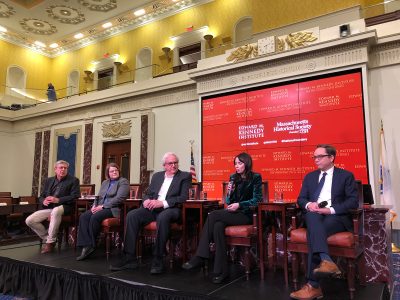As the nation ramps up for an election year, candidates and citizens are confronting difficult modern political issues. However, conversations surrounding justice, equity and common understanding have persisted since the founding of the U.S.

The Edward M. Kennedy Institute for the United States Senate held a panel entitled “Our Nation’s Founders and Today’s Political Challenges” Thursday night, which sought to reflect and acknowledge the connection between past, present and future legislation, as well as the ideology on topics such as healthcare, treatment of marginalized populations and generalized polarization.
The Institute partnered with the Massachusetts Historical Society for the event, hosting four experts on early American history to speak about the Revolutionary era of the United States and its relation to current issues in politics.
Nathaniel Sheidley, president and CEO of Revolutionary Spaces, an organization devoted to preserving historical sites in Boston, said in an interview that accurately recording history better serves the current American democracy and the panel discussion’s impact on its audiences.
“So we should use this opportunity to connect past and present in deep and resonant ways,” Sheidley said. “I think it can be a great window into a city-wide conversation about what the cultural work of remembering actually is.”
During the event, author Stephen Fried discussed letters written between John Adams and Benjamin Rush, a lesser-known signatory of the Declaration of Independence. These letters, Fried said, echo the contentious climates that run through both the early American period and modern times.
“The founders in their letters often express what I hear people expressed today, which is that we broke America, we pushed it so far that we finally broke it,” Fried said. “It’s such an ambitious experiment with incredible human drama, and such high challenges that it’s not surprising that people were afraid that they couldn’t rise to it.”
In his book, “Rush,” Fried describes how Benjamin Rush helped repair the argument between Thomas Jefferson and John Adams after their political disputes. Fried said their conflict was representative of the overall polarization of the time.
“Part of the story of America is that at any given time, people convince themselves that certain challenges and certain frictions have gone away, or we solved them, and then we realized that we have it,” Fried said. “There was America, there were two parties, they were incredibly mean to each other.”
Panelist Sara Georgini, the series editor of the Papers of John Adams Project, which catalogues the personal correspondence of the country’s second President John Adams, said history evolves and transforms as historians develop a deeper and more comprehensive understanding of the truth. Georgini also said that providing historical context for individual interpretation goes beyond just capturing the documents.
“It’s so important to bring people into the closest possible contact that you can with primary sources,” Georgini said. “I’ve committed to that for all of my career, and I think it’s important to do because everyone is going to interpret a document just a little bit differently.”
During the panel, the experts discussed the theme of polarity and isolation, noting that the founding fathers’ era wasn’t marked by universal agreement. In accordance with today’s divisiveness, speakers acknowledged that rivaling political parties continue to ceaselessly debate on circuitous topics.
Speaker Liz Covart hosts the podcast “Ben Franklin’s World,” which discusses the many facets of Franklin’s legacy in early America. She said public history discussions help narrow the distance between the historical and current political climate.
“I hope people gain context, a better understanding of the issues that we have today and how they’ve come to us from the past,” Covart said. “We believe that history tells us who we are and how we came to be who we are.”
For public historians like the four panelists, linking the past and present is a continuing and complex work, Georgini said, but that history’s debates and conflicts serve as common threads.
“I think that our best classroom is always the public square,” Georgini said. “And it’s a real chance for people to use history to think through present day events, to frame changes in context, to think about how government works.”
Joanne Agababian, an attendee who graduated in the first class of Boston University’s School of Public Health in 1979, said Americans haven’t learned well from history. She said the founding fathers debated how to best create a country and which values they wanted to establish, but said this divide still exists today.
“We tend to think of [the founding fathers] as perfect, and they weren’t,” Agababian said. “I think in today’s time, we forget that there has always been this divide that’s always existed in the country.”






















































































































